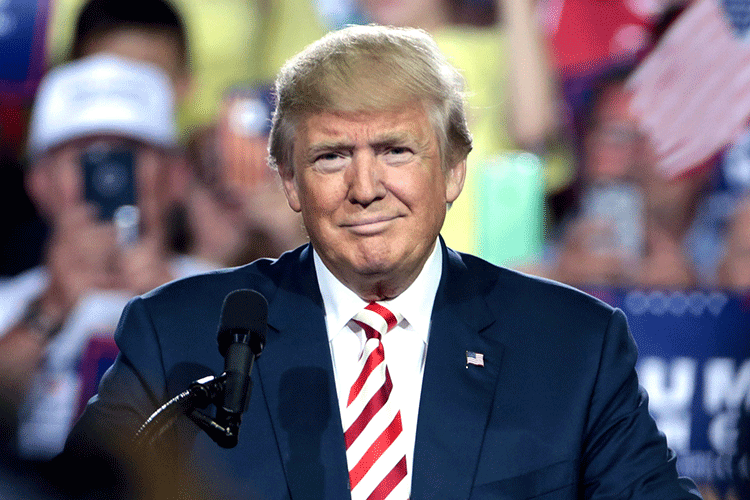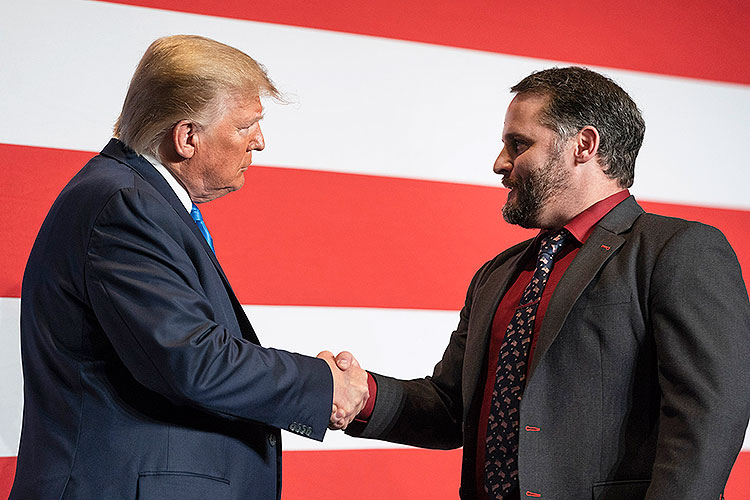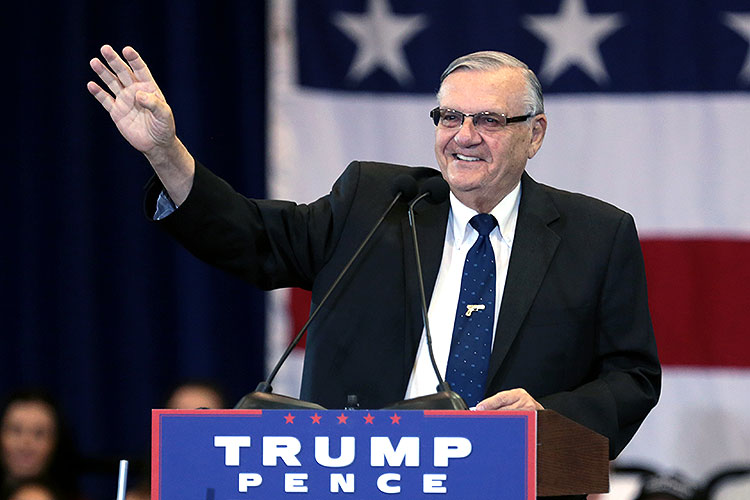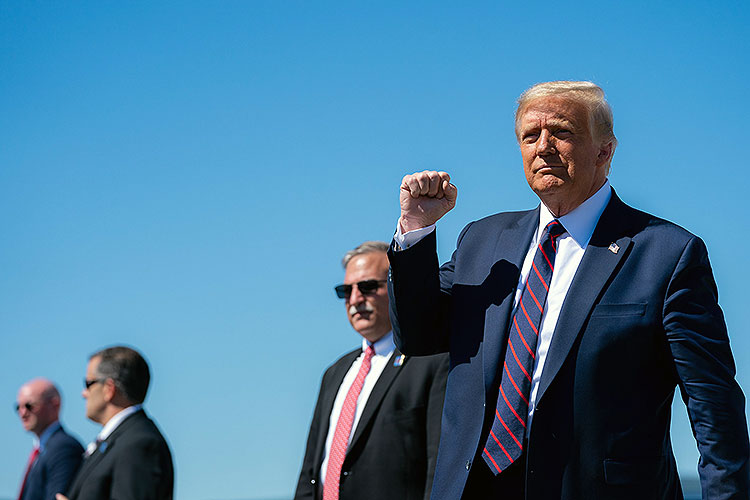
President Donald Trump has issued fewer pardons than any president in modern history - and many of them are for conservative political allies who have run afoul of the law, says UC Berkeley historian and legal scholar Daniel Farber. (Flickr photo by Gage Skidmore licensed under CC BY-SA 2.0)
The power to grant clemency to people accused or convicted of crimes is one of the broadest powers granted to a president under the U.S. Constitution. A president can grant a pardon to override a failure of the justice system, or in the spirit of mercy. But pardons also can stray into ethically gray areas.
President Gerald Ford famously - and controversially - pardoned Richard Nixon after his 1974 resignation. President Bill Clinton pardoned his brother, Roger, who had served time for drug offenses. President George H.W. Bush issued pardons for high-level White House staffers who were implicated in the Iran-Contra scandal during the presidency of Ronald Reagan.
President Donald Trump has issued fewer pardons than any president in modern times, says historian and author Daniel Farber, a professor in the University of California, Berkeley, School of Law. But, Farber adds, those pardons have often been to conservative political allies of his who have run afoul of the law.
Among them: Joe Arpaiao, the Arizona sheriff, who was found in contempt after ignoring court orders to stop improper immigration roundups. Bernard Kerik, the former New York City police commissioner convicted of tax fraud. Army Major Mathew L. Golsteyn, accused of war crimes in Afghanistan. Retired Lt. Gen. Michael Flynn, his former national security adviser, convicted of lying to the FBI about his contacts with Russia's U.S. ambassador before Trump took office in 2017.
But can the president pardon himself? That, Farber said in an interview, is another matter.
[This interview has been edited lightly for length and clarity]
Berkeley News: To set context, it is possible to characterize how presidents historically have used pardons? For crimes of conscience? Material crimes? Political crimes?
Daniel Farber: It's a long history, so the answer is: all of the above, at one time or another.
For example, pardons were used after the Civil War to exercise forgiveness toward rank-and-file supporters of the Confederacy, people who hadn't been leaders or officers. Pardons were also used quite frequently in the past, simply because sentences were considered to be too harsh.
One of the long-term trends has been a decline in the use of the pardon power during the course of the 20th century. There used to be maybe several hundred pardons a year, or commutations, which means reducing the sentence. But now, in a typical presidency, there might be a couple of hundred altogether.

President Donald Trump commuted the 40-month prison sentence of his friend and ally Roger Stone (above), in July 2020. Stone had been convicted of lying under oath and other actions to obstruct a congressional probe into Trump's 2016 campaign and possible ties to Russia. (Photo by Victoria Pickering via Flickr | CC BY-NC-ND 2.0)
President Trump in November pardoned his former national security adviser, Michael Flynn. In July, he pardoned his close political ally, Roger Stone, who had been convicted of lying under oath to a congressional committee and threatening a witness. Have Trump's pardons been more political, more personal, than those issued by past presidents?
Yes, definitely. Trump actually has not pardoned that many people. They've been kind of high-profile, so we've heard a lot about them, but compared to previous presidents, there are really not that many. And most of them are either people he knows or people who were, to some degree, public figures - maybe not public figures, necessarily, in the sense of being politically active, but somehow having gotten the attention of the press and, in particular, conservative media.
Very few ordinary people have been pardoned, compared to previous presidents.
Analysts have speculated that Roger Stone, one of Trump's campaign advisers, or Paul Manafort, his 2016 campaign manager, may have remained stoic during federal investigations of the president's political behavior - even after they were indicted - because they were counting on a pardon if they did not implicate Trump. Is that a customary use of the pardon? Is it legal to use a pardon in that way? Is it ethical?
It's certainly not customary. Maybe you could find a couple of scattered incidents in American history, but that's certainly not at all typical.
If the president were to offer to pardon people in exchange for them remaining quiet, that could be considered obstruction of justice. But if nothing explicit is ever said, then I think it's just another pardon. And basically, there are very few, if any, limits on who the president can pardon or for what reason.
So, I think it's probably legal. Is it ethical? No - clearly not.

Paul Manafort (right) served as Trump's campaign manager in 2016, but is now serving a 7.5-year prison term for conspiracy and fraud charges that rose from a federal investigation into Russian meddling in the U.S. election. Analysts have speculated that he remained silent about Trump's involvement in hopes of receiving a pardon. (Photo by Victoria Pickering via Flickr | CC BY-NC-ND 2.0)
The pardon power isn't designed to allow presidents to protect themselves. It's designed to deal with the harshness of the criminal justice system. It's completely inappropriate, if there was such an understanding. I don't know any more than what I read in the press about what these various people may be thinking, but it does seem plausible.
What about 'pre-emptive pardons' - pardons granted before there has been any official legal judgment of wrongdoing. How often have those been used?
They were used, obviously, in the case of Nixon. There have been a few others, but they've been very rare. Typically, pardons have been issued after the sentence was served, to allow people to regain their rights to vote and sort of clear their records.
But there really have been only a very few before a conviction, let alone before the case was brought. There's some dispute among scholars about whether that's even valid, or whether a pardon has to be for a specific offense, a specific charge, rather than a pardon for all potential charges relating to some event.
If there was a pre-emptive pardon, and there was a dispute about it, is that something that could be challenged on legal grounds, in court?
Well, it could be, I think. The most likely way would be a case brought against the person by the next president or the next administration. They could bring criminal charges, and the individual could ask the charges be dismissed because of the pardon. Then a judge would have to decide if the pardon was valid.

President Donald Trump (left) welcomed Army Major Mathew Golsteyn to a political event in 2019. Golsteyn was charged with murdering a suspected bomb-maker in Afghanistan in 2010, but Trump's pardon canceled his scheduled 2019 court-martial trial. (White House photo by Joyce N. Boghosian)
Could the president pardon members of his family, preemptively, for anything that they may have done? And has the pardon been used in that way before?
The answer to the second question is pretty clearly, 'No'.
In terms of the first question, the answer is that it would be legally valid, assuming preemptive pardons are valid at all. Constitutionally, the president can issue pardons to members of his or her own family just as much as anyone else.
If that happened, there would be some degree of controversy. The question would come up: Does Congress have power to block pardons or to challenge pardons that it sees as unethical, or inappropriate, or unjust?
The only way Congress could address that would be through impeachment. You can actually impeach somebody after they're out of office, because it would have the effect of preventing them from holding office again. But as a practical matter, it's pretty hard to imagine Congress pursuing it, let alone given the political situation.
But I should mention that the pardon only applies to federal offenses, and so the individuals or family members would remain open to state charges even if they were pardoned for federal charges. This is just a guess, but this would probably increase the likelihood of state prosecutions. At least, if I were a state prosecutor, and I thought that people had been unjustly freed from federal prosecution, I would feel like that was an extra reason to pursue an investigation.
In effect, the justice system would be exerting itself out of principle, to correct a perceived injustice?
I could imagine that happening now. But, of course, it really depends on what the offense is. There would have to be some violation of a state law.

Joe Arpaio, the former sheriff of Maricopa County in Arizona, was held in contempt of a federal court order when he continued to direct immigration round-ups that had been deemed illegal. Trump pardoned him in 2017. (Photo by Gage Skidmore via Wikimedia Commons | CC BY-SA 2.0)
For example, I've seen speculation - it may or may not have any basis -that Trump might pardon someone like Julian Assange (the WikiLeaks founder who has been charged with conspiring to leak U.S. classified materials) or Edward Snowden (a former National Security Agency contractor who revealed U.S. spy programs without authorization in 2013). It would be pretty hard to imagine what state offense they could be charged with - their offenses were pretty much directed against the United States government.
On the other hand, something like tax fraud would almost automatically also be a state offense because. The way state taxes work, the federal return carries over into the state tax determination. So there you might very well see a state prosecution interest. I do think prosecutors tend to take a dim view when people who they think pulled a fast one evade justice. That might provide some extra motivation.
Various press reports suggests the president takes a very personal interest in the appeals for clemency that come to him. Is this unusual?
Presidents have generally relied on a formal process to review pardon applications and determine their merits and report on the facts. Trump has really short-circuited all of that.
That's another way in which his pardon decisions have been more personal and political than previous presidents - they haven't gone through this vetting process.
Does Trump have the power to pardon himself?
That is a really interesting question. Nobody knows for sure what the answer is. As far as I'm aware, not only has that never happened at the federal level, but I haven't heard of any cases of governors pardoning themselves. And there certainly is not any history along those lines in England, where the pardon power came from.
So we don't really know. There are no court decisions. That being said, the argument in favor is that there aren't any express limits on the pardon power. And therefore, if you can pardon anyone at all, why not yourself?

Many reports suggest that the president is likely planning more pardons in the weeks before his term ends. (White House photo)
I think that that's a very dubious conclusion. There is little and probably no precedent for such a thing ever being done, and that's pretty strong evidence that nobody has ever really thought that it was a legitimate use of the pardon power. It doesn't make much sense in terms of what the purposes of the pardon power are supposed to be.
The Constitution says not just that he can pardon offenses, but that he can grant pardons, and granting something generally means giving it to someone else. So. if you think of a grant of land or, in the university context - you wouldn't issue a research grant to yourself. At least it seems pretty unusual.
If that happened, and if I were an incoming president, I might view that as a reason to test that right. It seems to be such an effort to evade justice that it almost calls for a response. It would probably take years to actually decide. I don't know what the politics would be, obviously, but my guess is that it would make a prosecution more likely, rather than less.
Is there a broader risk? Have we learned now that a president who is bold and who's willing to test the limits can orchestrate, or at least benefit from, illegal behavior, but then just pardon everyone involved? Is that a hole in the pardon process, constitutionally?
Yes, I think it would probably be an impeachable offense. It might conceivably give rise to some criminal charge against the president, although I'm unsure that that would stick.
But it's a problem, or at least a characteristic, of the Constitution generally, that it gives the president very broad powers … within limits. The pardon power is one of the least limited, but it's not the only one. The president can veto bills without having any good reason to do it. The president has all kinds of powers in foreign affairs that can be abused, and so forth.
Basically, the Constitution relies either on the good character of the president or on political checks to prevent real abuses of power. Those political checks, especially in a highly polarized era, just may not work.







